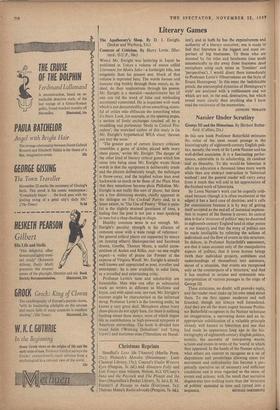Literary Games
The Apothecary's Shop. By D. J. Enright. (Seeker and Warburg, 2 s.) Contexts of Criticism. By Harry Levin. (Har- vard: O.U.P., 30s.) WHILE Mr. Enright was lecturing in Japan he published in Tokyo a volume of essays called Literature for Man's Sake—a forthright title, less enigmatic than his present one. Much of that volume is reprinted here. The words human and humane ring briskly through these essays, as, in- deed, do their implications through his poems. Mr. Enright is a moralist—undoctrinaire but (if one can rid the word of false and misleading accretions) committed. He is impatient with work which is not demonstrably about something, scorn- ful of critics who obfuscate the something when it's there. Look, for example, at the opening pages, a section of lively exchanges touched off by a twaddling and portentous 'Study in Critical Pro- cedure'; the wretched author of this study is (in Mr. Enright's hypothetical WEA class) 'thrown out into the snow.'
'The greater part of current literary criticism resembles a game of skittles played with ivory chess pieces,' writes Mr. Enright. The danger of the other kind of literary critical game which has come into being since Mr. Enright wrote those words is that the equipment is deliberately crude and the players deliberately tough; the technique is throw-away, and the implied values lean over backwards so much to be those of the Plain Man that they sometimes become plain Philistine. Mr. Enright is not really this sort of player, but there are a few distressing streaks, chiefly apparent in the dialogue on The Cocktail Party and, to a lesser extent, in 'The Use of Poetry.' What is pain- ful is the slightly strained jauntiness of tone, a feeling that the poet is not just a man speaking to men but a chap chatting to chaps.
Healthy common sense is not enough. Mr. Enright's peculiar strength is his alliance of common sense with a wide range of reference : the general critical pieces are supported by essays on (among others) Shakespearian and Jacobean drama, Goethe, Thomas Mann, a useful juxta- position of Auden and Rilke, and—as one might expect—a volley of praise for Forster at the expense of Virginia Woolf. Mr. Enright is already well known and appreciated as poet, traveller and entertainer: he is now available, in solid form, as a travelled and entertaining critic.
Professor Levin's taste and scholarship are formidable. Men who can offer us substantial work on writers as different as Marlowe and Joyce, and with equal ease, are rare. Mr. Enright's manner might be characterised as the informed shrug. Professor Levin's is the knowing smile; he knows a very great deal. Metaphors about ivory chess-pieces do not apply here, for there is nothing footling about these essays, most of which began life as contributions to high-powered symposia at American universities. The book is divided into broad fields ('Working Definitions' and 'Long Views') and narrower ones ('Notations on Novel-
ists'), and in both he has the expansiveness and authority of a literary executive; one is made to feel that literature is the biggest and most im- portant of big businesses. To those who are daunted by the titles and headnotes (one tends automatically to, shy away from fearsome dead metaphors using such terms as 'frontiers' and 'perspectives), I would direct them immediately to Professor Levin's 'Observations on the Style of Ernest Hemingway.' In this essay the 'indubitable punch, the unexampled dynamics of Hemingway's style' are analysed with a ruthlessness and wit which are not, in the end, destructive, but which reveal more clearly than anything else I have read the mechanics of the mannerism.
ANTHONY THWAITE










































































 Previous page
Previous page